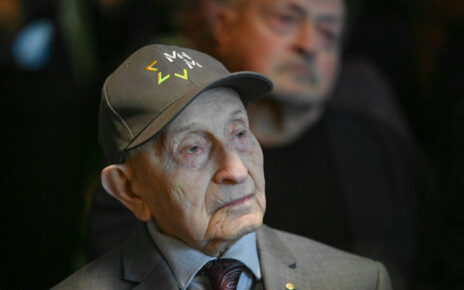THE Armistice between the Allies and Germany began at 11am on November 11, 1918, signalling the beginning of the end of the First World War.
A two-minute silence is observed on Remembrance Day to commemorate those who heroically sacrificed their lives in any conflict so that we may live in freedom — at the 11th hour on the 11th day of the 11th month, we will remember them.
Quotes
Czeslaw Milosz, The Issa Valley
“Praising what is lost makes the remembrance dear.”
Harold Nicolson, British delegate to the 1919 Paris Peace Conference
“How important it is for us to recognise and celebrate our heroes and she-roes.”
Maya Angelou
“When our perils are past, shall our gratitude sleep?”
Thomas Bailey Aldrich
“All we have of freedom, all we use or know — / This our fathers bought for us long and long ago.”
REAM MORE ON REMEMBRANCE DAY
ROYAL HONOUR
POPPY FURY
Rudyard Kipling, The Old Issue
“When you go home, tell them of us and say, for their tomorrow we gave our today.”
John Maxwell Edmonds
“The legacy of heroes is the memory of a great name and the inheritance of a great example.”
Benjamin Disraeli, speech to the House of Commons, February 1, 1849
“You remember only what you want to remember. You know only what your heart allows you to know.”
Thomas Campbell, Hallowed Ground
“To live in hearts we leave behind is not to die.”
MOST READ IN NEWS
BLOCKHEADS
BLAZE FURY
HIGH ALERT
CAVED IN
Laurence Binyon, For The Fallen
“They shall grow not old, as we that are left grow old: Age shall not weary them, nor the years condemn. / At the going down of the sun and in the morning, We will remember them.”
Paul Rubens, Your King and Country Need You
“We shall want you and miss you but with all our might and main / we shall cheer you, thank you, kiss you when you come back again.”
Amy Tan, Saving Fish from Drowning
“You remember only what you want to remember. You know only what your heart allows you to know.”
Poems
The Remembrance Day poem, In Flanders Fields, was written by John McCrae during the First World War.
It is often read at services remembering those who were lost in both World Wars.
John McCrae wrote In Flanders Fields after losing his friend and fellow soldier Alexis Helmer in Belgium during World War
Lieutenant Colonel McCrae wrote the poem after seeing red poppies growing in the battle-scarred fields of Flanders, Belgium.
It reads:
In Flanders fields the poppies blow
Between the crosses, row on row,
That mark our place; and in the sky
The larks, still bravely singing, fly
Scarce heard amid the guns below.
We are the Dead, Short days ago
We lived, felt down, saw sunset glow,
Loved, and we loved, and now we lie,
In Flanders fields
Take up our quarrel with the foe:
To you from failing hands we throw
The torch; be yours to hold it high.
If ye break faith with us who die
We shall not sleep, though poppies grow
In Flanders fields
Here are some other Remembrance poems…
For the Fallen
Penned by Laurence Binyon, this is probably the most famous English war poem.
Also known as the Ode of Remembrance, it was first published in the Times on September 21, 1914 — just two months after the First World War began on July 28.
Binyon was too old to enlist as a soldier in the Great War, but he volunteered in hospitals, helping wounded French soldiers.
He wrote For the Fallen in Cornwall shortly after the Battle of Marne:
They shall grow not old, as we that are left grow old: Age shall not weary them, nor the years condemn.
At the going down of the sun and in the morning, We will remember them.
The Soldier
This poem was written at the beginning of the First World War by Rupert Brooke.
He was part of the British Mediterranean Expeditionary Force and died of an infection in 1915.
The most famous lines from The Soldier are often read in remembrance of those who died far from home while fighting for their country:
If I should die, think only this of me:
That there’s some corner of a foreign field
That is for ever England.
Recessional
The phrase “Lest We Forget’’ originates from this poem, which was written by Rudyard Kipling for Queen Victoria’s Diamond Jubilee in 1897.
God of our fathers, known of old,
Lord of our far-flung battle line,
Beneath whose awful hand we hold
Dominion over palm and pine —
Lord God of Hosts, be with us yet,
Lest we forget—lest we forget!
The tumult and the shouting dies;
The Captains and the Kings depart:
Still stands Thine ancient sacrifice,
An humble and a contrite heart.
Lord God of Hosts, be with us yet,
Lest we forget—lest we forget!
Far-called, our navies melt away;
On dune and headland sinks the fire:
Lo, all our pomp of yesterday
Is one with Nineveh and Tyre!
Judge of the Nations, spare us yet,
Lest we forget—lest we forget!
If, drunk with sight of power, we loose
Wild tongues that have not Thee in awe,
Such boastings as the Gentiles use,
Or lesser breeds without the Law—
Lord God of Hosts, be with us yet,
Lest we forget—lest we forget!
For heathen heart that puts her trust
In reeking tube and iron shard,
All valiant dust that builds on dust,
And, guarding, calls not Thee to guard;
For frantic boast and foolish word—
Thy Mercy on Thy People, Lord!
And Death Shall Have No Dominion
Penned by Welsh poet Dylan Thomas in 1933, between the two wars.
The poem embraces the theme of remembrance and eternity of the human spirit:
They shall have stars at elbow and foot;
Though they go mad they shall be sane,
Though they sink through the sea they shall rise again;
Though lovers be lost love shall not; And death shall have no dominion.
An Irish Airman Foresees his Death
WB Yeats’ poem is a soliloquy given by an aviator in the First World War.
The narrator describes the circumstances surrounding his imminent death:
The years to come seemed waste of breath,
A waste of breath the years behind In balance with this life, this death.
MCMXIV — Philip Larkin
Written in 1964, Larkin captures the patriotic optimism of young men queuing to enlist in the forces in 1914.
The poem also reflects on the momentous changes in England following the First World War, ending with the line: “Never such innocence again.
Never such innocence, Never before or since,
As changed itself to past Without a word – the men
Leaving the gardens tidy,
The thousands of marriages,
Lasting a little while longer:
Never such innocence again.
Dreamers — Siegfried Sassoon
Sasson, who fought on the Western Front, wrote Dreamers while he was convalescing at Craiglockhart Hospital.
Soldiers are citizens of death’s grey land,
Drawing no dividend from time’s to-morrows.
In the great hour of destiny they stand,
Each with his feuds, and jealousies, and sorrows.
Soldiers are sworn to action; they must win
Some flaming, fatal climax with their lives.
Soldiers are dreamers; when the guns begin
They think of firelit homes, clean beds and wives.
I see them in foul dug-outs, gnawed by rats,
And in the ruined trenches, lashed with rain,
Dreaming of things they did with balls and bats,
And mocked by hopeless longing to regain
Bank-holidays, and picture shows, and spats,
And going to the office in the train.
An extract from Charge of the Light Brigade — Alfred, Lord Tennyson
Alfred, Lord Tennyson, wrote this poem on December 2, 1854, after reading a newspaper report about the Battle of Balaclava.
Half a league, half a league,
Half a league onward, All in the valley of Death
Rode the six hundred. “Forward, the Light Brigade!
Charge for the guns!” he said:
Into the valley of Death Rode the six hundred.
When can their glory fade? O the wild charge they made!
All the world wonder’d.
Honour the charge they made! Honour the Light Brigade,
Noble six hundred!
An extract from Dulce et Decorum Est — Wilfred Owen
Soldier Owen died just seven days before the Armistice between Germany and the Allies was signed in 1918.
READ MORE ON THE SUN
SHADY LADIES
CHOC GONE
Owen wrote about the horrors of trench and gas warfare.
If in some smothering dreams, you too could pace
Behind the wagon that we flung him in,
And watch the white eyes writhing in his face,
His hanging face, like a devil’s sick of sin;
If you could hear, at every jolt, the blood
Come gargling from the froth-corrupted lungs,
Obscene as cancer, bitter as the cud
Of vile, incurable sores on innocent tongues —
My friend, you would not tell with such high zest
To children ardent for some desperate glory,
The old Lie: Dulce et decorum est Pro patria mori.
Source: Read Full Article



